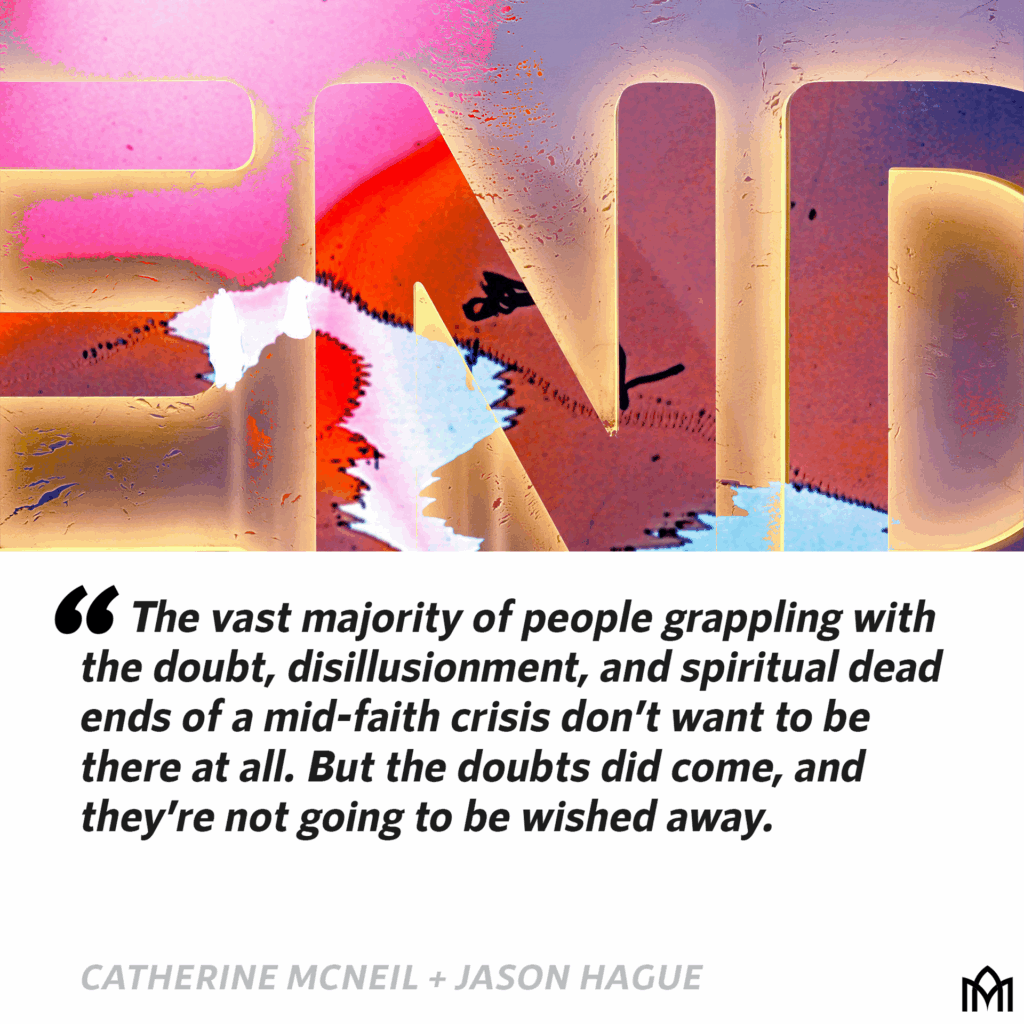Finding a Path Through Spiritual Dead Ends
“Has anyone seen Sally lately? She hasn’t been to church in months.”
“No. She was really upset about that pastor on the news who turned out to be so abusive. I’m afraid she might be deconstructing her faith.”
If you’ve spent any time lingering in church foyers or coffee shops during the past few years, you’ve probably heard a conversation like this. You may have even started the conversation—or been the subject of the conversation. This scenario is so common it’s become cliche: someone starts questioning an aspect of their faith, and the dominos fall over. Another believer joins the growing rank of the “nones and dones,” those who no longer feel they have a home in a faith community.
Yet for how frequently we see it, most of us can’t quite put our finger on what’s really happening. For some, “deconstruction” means simply asking hard questions. For others, it’s more dangerous, synonymous with walking away from Jesus altogether.
However we define deconstruction, many of us are afraid of it, often too overwhelmed to talk openly and honestly about what’s going on. So instead we make assumptions about the Sallys of the world, that they wanted this, that they lacked faith, that they’re to blame. This is a convenient assumption to make, because if we believe the doubters and those deconstructing are looking for exits out of their faith, loopholes to stop believing, or zingers to take down spiritual leaders, then we don’t have to worry if it will happen to us or our loved ones. We don’t have to be concerned that there’s truth behind it all.
But the reality is that the vast majority of the men and women grappling with the doubt, disillusionment, and spiritual dead ends of a mid-faith crisis don’t want to be there at all. They didn’t ask for the uncertainty, and they wish they could go back to a time before the doubts ever came. But the doubts did come, and they’re not going to be wished away.
A Crisis of Faith
Most of the time, a crisis of faith is truly a crisis. It starts with something terrible and unexpected, like betrayal at the hands of a beloved church leader. When a supposed man (or woman) of God is revealed to be a serial abuser, those who revered him (or her) might not be able to stop the onslaught of questions. Questions that sound like this:
- “If God is real, why do pastors keep doing this?”
- “Are there any Christians who are not hypocrites?”
- “Was everything my pastor taught us a lie? Everything?”
Far from contrived or self-serving, grappling with concerns like these feel like being attacked. When an earnest follower of Jesus begins to see that the path they’ve been following is going somewhere that looks nothing like Jesus, it’s disorienting, a sort of spiritual vertigo. We wonder whether God is actually powerful and good, whether God cares, whether God exists.
The vast majority of people grappling with the doubt, disillusionment, and spiritual dead ends of a mid-faith crisis don’t want to be there at all. But the doubts did come, and they’re not going to be wished away. Share on X
Crises of faith arrive for other reasons, too, such as:
- Discovering a long-held belief is simply false
- Getting a terrible diagnosis or experiencing the death of a loved one
- Feeling like God is far away, abandoning you to walk alone through the valley
- Questioning the cultural or political “bonus beliefs” your church requires you to hold and defend.
One thing quickly leads to another, and suddenly almost nothing makes sense anymore.
Whatever the inciting incident, the result is the same: those of us experiencing this faith crisis are left with the fear that our belief in God and our life as Christians is slipping away without our consent. And those of us watching on the outside are almost as afraid. If we assume Sally wants to walk away from God, if we shake our heads and conclude “She’s deconstructing,” we are only reinforcing the narrative that doubt is a slippery slope leading straight off the edge of faith itself.
But what if we could realize that, as the old saying goes, every crisis is an opportunity? Unmasking what is false in our faith traditions and communities is not necessarily a path away from God, but a chance to regroup, make necessary course corrections, and join up on a road more authentically Christ-like than the one we left behind.
When an earnest follower of Jesus begins to see that the path they’ve been following is going somewhere that looks nothing like Jesus, it’s disorienting, a sort of spiritual vertigo. We wonder whether God is actually good. Share on X
The Opportunity in Crisis
As we wrote in Mid-Faith Crisis, what we’ve learned through research, our own life experience, and countless conversations with people of faith is that a long, faithful life of persevering faithfulness is almost never as straightforward as hearing the truth, accepting Jesus, and staying the course. In reality, almost everyone encounters a mid-faith crisis or two, a season when everything seemed to fall apart after we were solid and sure in our formational journeys. Researchers have even found this to be a normative and healthy season in the life-cycle of faith, for there are things we need to relearn, reconsider, and reject as we mature. Yes, the process of wrestling through this can be awful—and the inciting incident is nearly always a true and terrible crisis. But the road ahead does not lead to certain death, not even death of faith.
There can be a stronger, truer, more faithful, more Jesus-like faith on the other side.
Friends, there is life after the mid-faith crisis. If you or your loved ones are in the throes of questions, doubt, disillusionment, and disorientation, we encourage you to lean in, and process the difficult, frightening reality—the toxic church, the abusive pastor, the season of suffering, the changing beliefs—with honesty, authenticity, and grace. God is not threatened by your real questions—and wrestling these issues and questions can be necessary for real change to occur, change the church desperately needs.
Take a deep, deep breath. Life—and faith—comes with hard seasons, but we are not alone. We have God’s Spirit to comfort and guide us, and we have each other. We do not need to be afraid.
Will the Sallys in our lives and families end up coming back to church? Will they continue seeking God and following Jesus? That’s hard to say. Life is long, complicated, and messy. Some wounds take a long time to heal, and some scars make faith and community difficult. But let’s keep leaning into the goodness of God, without fear of doubts. Whatever we throw at God, God can handle with mercy and compassion.
And over all this, may we clothe ourselves in love.
///
Unmasking what is false in our faith tradition is not necessarily a path away from God, but a chance to regroup, make necessary course corrections, and join up on a road more authentically Christ-like than the one we left behind. Share on X




